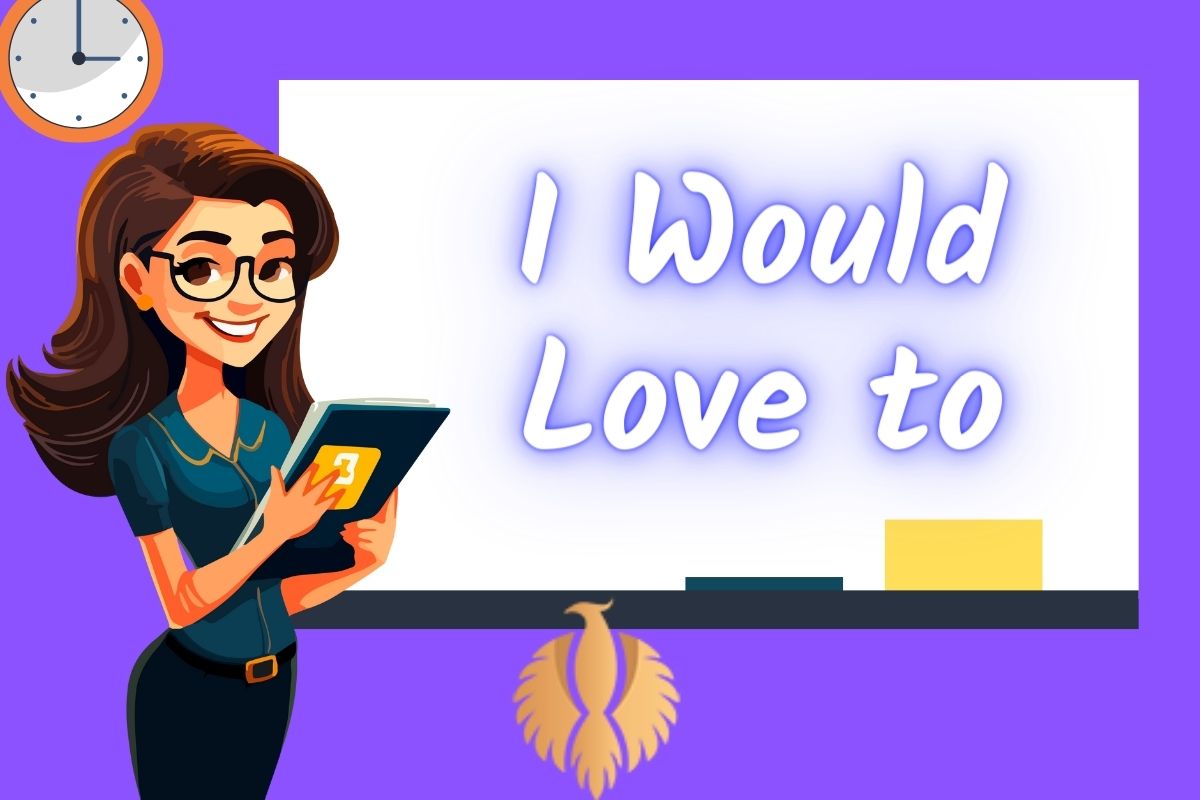Here are the top 50 professional synonyms for “I would love to”:
I would be delighted to
I would be pleased to
I would be happy to
I would appreciate the opportunity to
I would be glad to
I would welcome the chance to
I am eager to
I am enthusiastic about
I am keen to
I would greatly enjoy
I am excited to
I would be honored to
I am looking forward to
I would be thrilled to
It would be my pleasure to
I am ready to
I would embrace the opportunity to
I am committed to
I would commit to
I would jump at the chance to
I have a strong interest in
I would be inclined to
I would support the idea of
I am willing to
I would actively engage in
I would participate in with enthusiasm
I would be supportive of
I am prepared to
I would greatly appreciate
I would relish the opportunity to
I would be more than happy to
I am passionate about
I would be overjoyed to
I would like to
I would consider it a privilege to
I would be satisfied to
I am motivated to
I would take great pleasure in
I am open to
I would be all for
I am willing to pursue
I would thoroughly enjoy
I am engaged in
I would undertake with enthusiasm
I would be interested in
I would like nothing more than to
I am committed to pursuing
I would find joy in
I would strive to
I would like to take part in
Important Points:
Professional Tone: Using synonyms for “I would love to” can elevate the professionalism of your communication.
These phrases not only capture enthusiasm but also convey respect for the recipient and the opportunity at hand.
You might also enjoy: Top 100 Commonly Used Verbs That Start With D [2024]

Context Matters: Different phrases may be more appropriate depending on the context—formal emails, presentations, or casual interactions among colleagues.
Choosing the right expression is crucial for effective communication.
Conveying Enthusiasm: While “I would love to” expresses eagerness, its synonyms can add nuance—some might convey more excitement, while others emphasize willingness or readiness, offering a more tailored emotional response.
Enhancing Vocabulary: Expanding your repertoire of expressions can enhance your overall vocabulary, making your communication more engaging and diverse.
It aids in avoiding repetition and keeping discussions lively.
Cultural Sensitivity: Different cultures may respond to enthusiastic expressions in varying ways.
Being mindful of how enthusiasm is expressed can help in building better professional relationships across diverse teams and clients.
Now, let’s explore these professional synonyms in greater depth, examining when and how to use them effectively in different scenarios.
In the ever-evolving landscape of professional communication, how we express enthusiasm and interest can significantly impact our interactions with colleagues, clients, and stakeholders.
The phrase “I would love to” is commonly used to convey eagerness or a strong desire to engage in an opportunity.
However, in various professional settings, it is crucial to articulate this enthusiasm in a manner that is not only sincere but also appropriate for the context.
You might also enjoy:Looking Forward To Seeing You: Grammar + Examples[2025]
As we delve into the top 50 professional synonyms for “I would love to,” we aim to provide you with a robust toolbox of expressions that will allow you to tailor your language to suit diverse situations.
From formal business proposals to casual team collaborations, having an array of interchangeable phrases at your disposal can enhance your communication style, making it more engaging and sophisticated.
Professional settings often require a level of decorum, and phrases such as “I would be delighted to” or “It would be my pleasure to” not only communicate your enthusiasm but also reflect your respect for the opportunity and the people involved.
On the other hand, more enthusiastic expressions like “I would jump at the chance” convey a sense of excitement that can energize your conversation and inspire collaboration among team members.
Moreover, contextual awareness is key.
Knowing when to use a more subdued expression versus a highly enthusiastic one can shape how your message is received, enabling you to forge stronger professional relationships.
This understanding of context will also allow you to be culturally sensitive in diverse environments, as expressions of eagerness can vary between cultures.
Throughout this exploration, we will dive deeper into each synonym, providing examples and situational contexts for effective application.
By expanding your vocabulary and refining your expression of enthusiasm, you will not only improve your professional interactions but also position yourself as a more compelling and dynamic communicator.
Join us as we embark on this illuminating journey through the top 50 professional synonyms for “I would love to,” empowering you to articulate your interests and excitement in a variety of professional scenarios with confidence and finesse.
Through this understanding, you will enhance your communication skills, making your conversations more impactful and engaging for everyone involved.
You might also enjoy:Emersion Vs Immersion: Meaning, Differences, and Examples
50 Professional Synonyms for “I would love to”
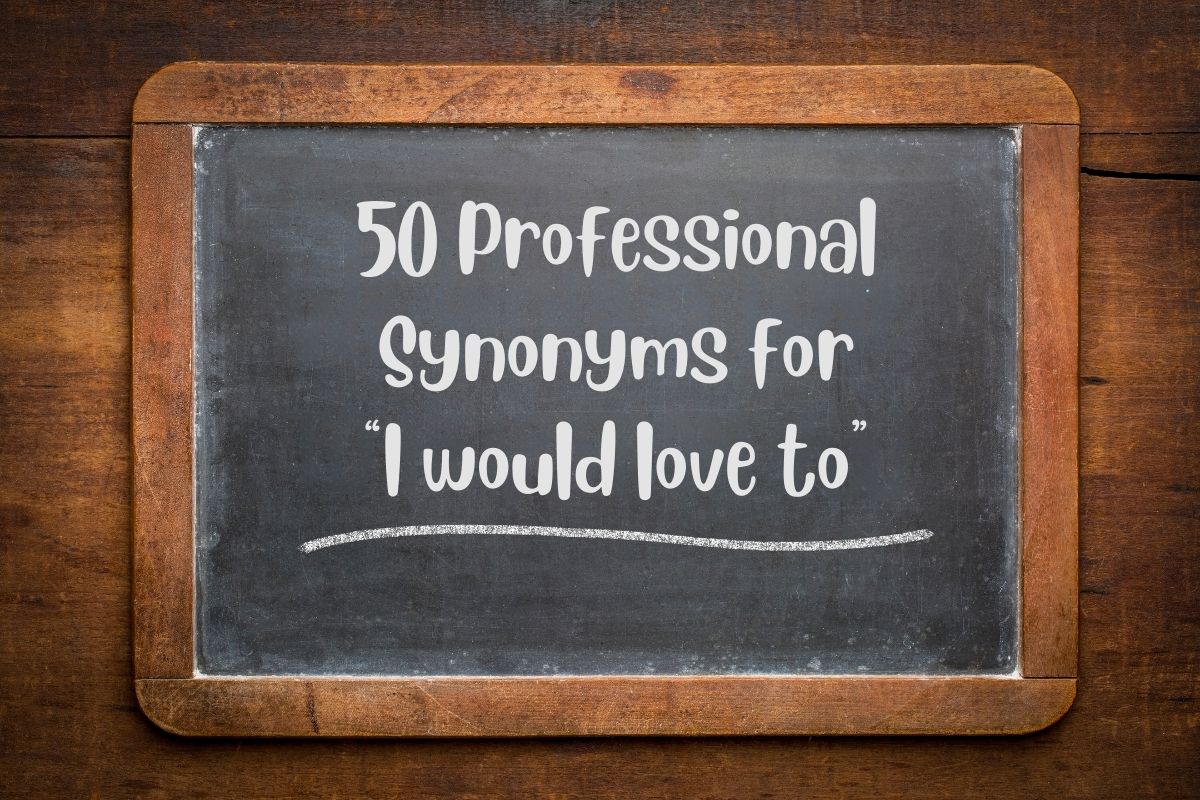
- I am highly interested in…
- It would be a pleasure to…
- I am eager to…
- I am enthusiastic about…
- It would be an honour to…
- I am keen on…
- I am excited to…
- I am thrilled to…
- It would be a privilege to…
- I am deeply passionate about…
- I am genuinely intrigued by…
- I am captivated by…
- It would be a delight to…
- I am genuinely excited about…
- I am sincerely interested in…
- I am wholeheartedly enthusiastic about…
- It would be a great joy to…
- I am genuinely thrilled to…
- I am truly fascinated by…
- It would be an absolute pleasure to…
- I am completely engrossed in…
- I am truly captivated by…
- It would be a source of immense satisfaction to…
- I am sincerely motivated by…
- I am genuinely inspired by…
- It would be a remarkable opportunity to…
- I am deeply committed to…
- I am genuinely dedicated to…
- It would be a momentous occasion to…
- I am sincerely devoted to…
- I am genuinely invested in…
- I am deeply passionate about the prospect of…
- It would be a significant milestone to…
- I am genuinely thrilled by…
- I am earnestly driven by…
- It would be an exceptional chance to…
- I am sincerely captivated by…
- I am genuinely engrossed in…
- It would be an enriching experience to…
- I am deeply fascinated by…
- I am truly enthusiastic about…
- I am genuinely compelled by…
- It would be a marvellous opportunity to…
- I am sincerely intrigued by…
- I am genuinely impassioned by…
- It would be a remarkable privilege to…
- I am deeply interested in…
- I am sincerely motivated to…
- It would be an extraordinary honour to…
- I am genuinely thrilled at the prospect of…
Mastering professional communication involves using diverse vocabulary to express enthusiasm and interest.
By incorporating these top 50 professional synonyms for “I would love to” into your repertoire, you can convey your passion and dedication more effectively.
Remember, choosing the right synonym can leave a lasting impression and enhance your professional interactions.
You Might Also Enjoy: Top 60 Most Common Simple Sentences In English
Contexts that we Use “I would love to”
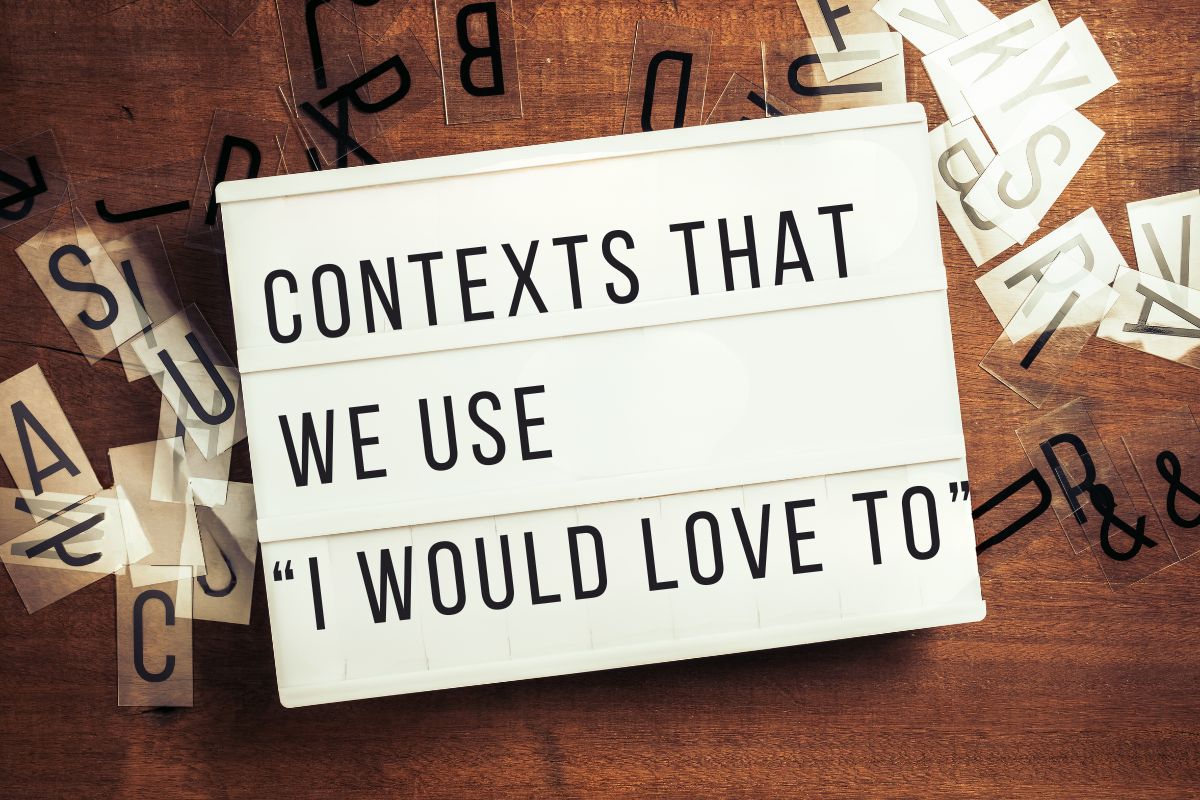
“I would love to” is a phrase commonly used to express enthusiasm, desire, or willingness to do something. It can be used in various contexts, such as:
- Social invitations: “I would love to join you for dinner.”
- Expressing interest in a hobby or activity: “I would love to learn how to play the piano.”
- Expressing interest in trying something new: “I would love to try that new restaurant.”
- Expressing willingness to help or assist someone: “I would love to help you with your project.”
- Expressing a desire to meet or spend time with someone: “I would love to see you again soon.”
- Expressing enthusiasm for a future event or experience: “I would love to go on a vacation to a tropical island.”
- Expressing interest in a job or career opportunity: “I would love to work for your company.”
- Expressing interest in a romantic or intimate gesture: “I would love to have a candlelit dinner with you.”
- Expressing interest in a personal goal or aspiration: “I would love to run a marathon someday.”
- Expressing interest in a travel destination: “I would love to visit Paris one day.”
Overall, “I would love to” is used to convey excitement, eagerness, and a positive attitude towards various situations or experiences.
Examples with “I would love to”
- I would love to go on a vacation to a tropical island.
- I would love to learn how to play the guitar.
- I would love to have a cup of coffee right now.
- I would love to spend the day at the beach.
- I would love to meet my favourite celebrity.
- I would love to have a picnic in the park.
- I would love to read a good book.
- I would love to go hiking in the mountains.
- I would love to try a new restaurant in town.
- I would love to learn a new language.
- I would love to go skydiving.
- I would love to watch a movie at the cinema.
- I would love to have a spa day.
- I would love to go on a road trip with friends.
- I would love to visit a famous landmark.
- I would love to have a lazy day in bed.
- I would love to go on a shopping spree.
- I would love to attend a live concert.
- I would love to volunteer for a good cause.
- I would love to try a new hobby.
- I would love to go on a cruise.
- I would love to have a candlelit dinner.
- I would love to go on a safari.
- I would love to learn how to cook a new dish.
- I would love to have a pet dog.
- I would love to go horseback riding.
- I would love to visit an art museum.
- I would love to go bungee jumping.
- I would love to attend a music festival.
- I would love to have a weekend getaway.
You might also enjoy:How Are You Fairing or Faring? Differences + Examples
Informal Alternatives for “I would love to”
Here are a few informal alternatives for expressing acceptance:
- “Sure thing!”
- “Absolutely!”
- “Count me in!”
- “You bet!”
- “No problem!”
- “Sounds good to me!”
- “I’m game!”
- “Definitely!”
- “That works for me!”
- “I’m down!”
These informal alternatives can be used in casual conversations or among friends, but it’s important to adjust your language according to the context and the people you are speaking with.
You might also enjoy:Too Cute Meaning Vs To Cute (To Vs Too) + Examples
The Antonyms of “I Would Love to”

Effective communication in professional settings requires not only expressing enthusiasm and interest but also acknowledging situations when one may not be inclined to participate or take on certain tasks.
While the phrase “I would love to” is commonly used to convey eagerness, it’s equally important to be aware of its antonyms that express hesitation or disinterest.
In this part of article essay, I will explore the opposite expressions of “I would love to,” providing you with a range of antonyms to better navigate professional communication.
1. Expressing Hesitation and Disinterest
I am hesitant to…
When you want to convey a sense of caution or reservation, this phrase indicates your reluctance or doubt about the proposed opportunity or task.
It would be challenging for me to…
By using this antonym, you express that the proposed endeavour presents difficulties or obstacles that make it less appealing to you.
I am not inclined to…
This phrase communicates a lack of natural inclination or desire to engage in the suggested activity, indicating a disinterest or lack of motivation.
It would not be my preference to…
By using this antonym, you convey that the proposed option or task is not aligned with your personal preferences or interests.
I am not enthusiastic about…
When you want to express a lack of genuine excitement or passion, this phrase effectively conveys your disinterest or lack of enthusiasm.
2. Conveying Reluctance and Disinclination
I am not keen on…
This antonym highlights your lack of eagerness or interest, indicating that you are not particularly enthusiastic about the proposed opportunity.
I am not excited to…
When you do not feel genuinely thrilled or eager, this phrase conveys your lack of excitement or anticipation.
I am not thrilled to…
By using this antonym, you express a lack of excitement or enthusiasm, indicating that you do not find the proposed endeavour appealing.
It would not be a priority for me to…
This phrase communicates that the suggested task or opportunity does not hold a high level of importance or urgency in your priorities.
I am not deeply passionate about…
When you want to emphasise your lack of strong commitment or fervour for a particular topic or opportunity, this antonym effectively conveys your disinterest.
3. Expressing Lack of Interest
I am not intrigued by…
This phrase indicates your lack of interest or curiosity, suggesting that the proposed opportunity does not capture your attention.
I am not captivated by…
By using this antonym, you convey a lack of fascination or engagement, indicating that the suggested endeavour does not hold your interest.
It would not be a delight to…
This phrase conveys a lack of joy or pleasure, indicating that the proposed activity does not bring you satisfaction or happiness.
I am not genuinely excited about…
When you want to express your lack of genuine enthusiasm or anticipation, this antonym effectively conveys your disinterest or lack of excitement.
I am not sincerely interested in…
By using this phrase, you showcase your lack of sincere curiosity or eagerness to explore the opportunity or task at hand.
While expressing enthusiasm and interest is important in professional communication, acknowledging the opposite sentiments is equally crucial.
By incorporating the antonyms of “I would love to” into your vocabulary, you can effectively convey hesitation, disinterest, or lack of enthusiasm when necessary.
Remember, it is essential to communicate honestly and respectfully in professional settings, even when expressing hesitation or disinterest.
By being aware of these antonyms, you will be better equipped to navigate professional conversations and opportunities, ensuring clear and transparent communication.
Some Examples of Situations where “I would love to” can be Used to Politely Decline an Offer or Invitation
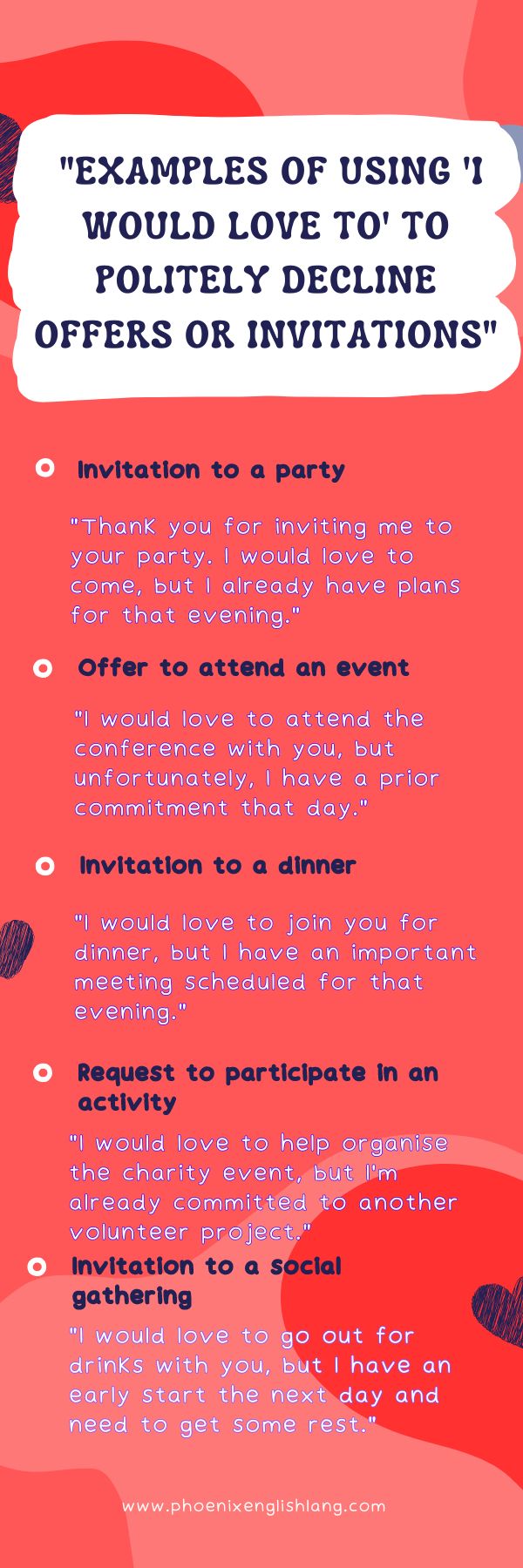
Here are some examples of situations where “I would love to” can be used to politely decline an offer or invitation:
1. Invitation to a party
“Thank you for inviting me to your party. I would love to come, but I already have plans for that evening.”
2. Offer to attend an event
“I would love to attend the conference with you, but unfortunately, I have a prior commitment that day.”
3. Invitation to a dinner
“I would love to join you for dinner, but I have an important meeting scheduled for that evening.”
4. Request to participate in an activity
“I would love to help organise the charity event, but I’m already committed to another volunteer project.”
5. Invitation to a social gathering
“I would love to go out for drinks with you, but I have an early start the next day and need to get some rest.”
In these examples, “I would love to” is used to express genuine interest and enthusiasm while politely declining the offer or invitation due to prior commitments or other reasons.
This allows the speaker to convey a positive sentiment while respectfully declining the invitation.
You might also enjoy:What Kind of Vs What Kinds of – Differences + Examples [2025]
Why is it important to provide a brief explanation when declining an offer or invitation?
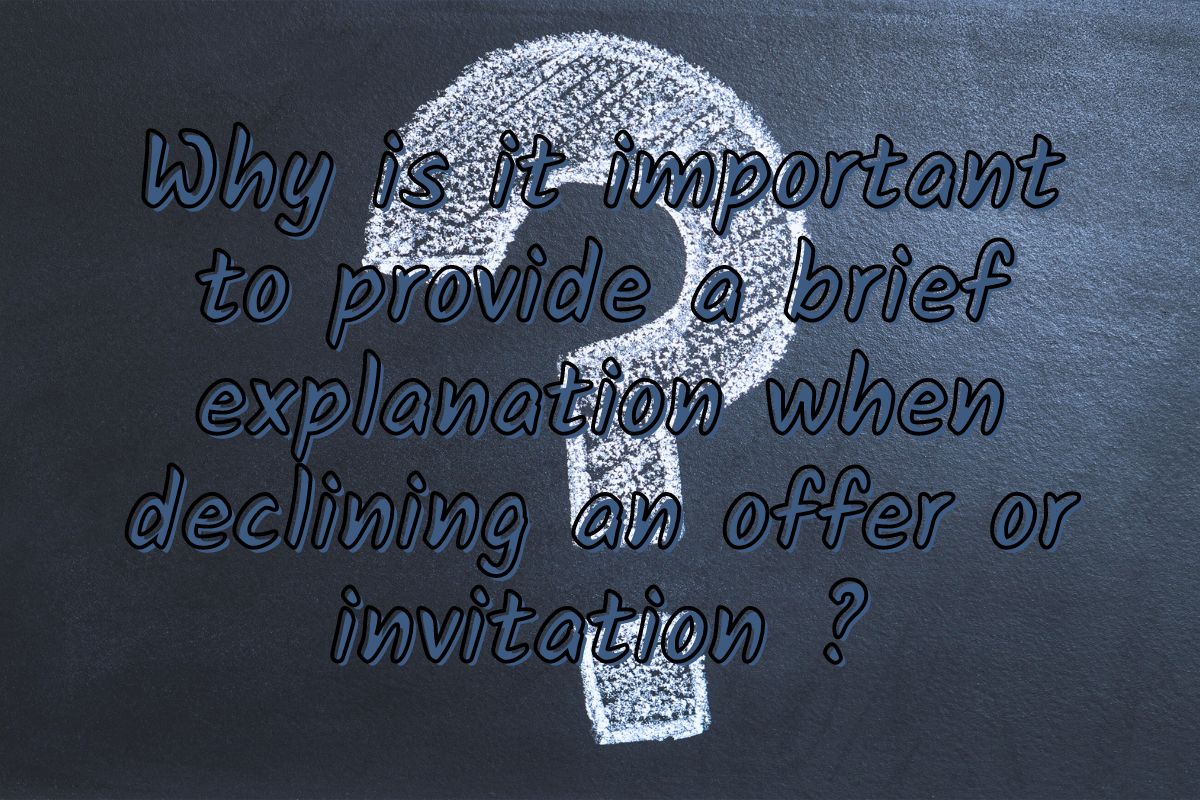
Providing a brief explanation when declining an offer or invitation is important for several reasons:
1. Clarity
Offering a brief explanation helps the other person understand that your decline is not due to a lack of interest or disregard for their invitation. This clarity can prevent misunderstandings and maintain positive communication.
2. Respect
By providing an explanation, you show respect for the person extending the invitation. It demonstrates that you value their offer and are taking the time to communicate your reasons for declining.
3. Consideration
Offering a brief explanation shows consideration for the other person’s feelings and efforts. It acknowledges their invitation and allows them to understand your circumstances, which can help avoid any potential disappointment or confusion.
4. Relationship maintenance
When you decline an offer or invitation with a brief explanation, it helps maintain a positive relationship. It shows that you are thoughtful and considerate, even when unable to accept the invitation.
5. Future opportunities
By explaining your reasons for declining, you leave the door open for future opportunities to connect or participate in similar activities.
This can help maintain a positive rapport and potentially lead to future engagements.
Providing a brief explanation when declining an offer or invitation is a courteous and considerate way to communicate, fostering positive interactions and maintaining respectful relationships.
You might also enjoy:Interested In or On: The Differences + Examples [2025]
Other Ways to Politely Decline an Offer or Invitation
There are several polite ways to decline an offer or invitation. Some alternatives to “I would love to” include:
1. Expressing gratitude and explaining the reason for declining:
– “Thank you so much for the invitation, but I have a prior commitment.”
– “I really appreciate the offer, but unfortunately, I won’t be able to attend due to a scheduling conflict.”
2. Suggesting an alternative plan or expressing interest in future opportunities:
– “I’m unable to join this time, but I’d love to catch up with you another day.”
– “I can’t make it, but I hope we can plan something in the future.”
3. Conveying regret and appreciation:
– “I’m sorry, I won’t be able to make it, but I hope you have a great time.”
– “I wish I could join, but I have a prior commitment. Thank you for thinking of me.”
4. Politely declining while acknowledging the offer
– “I’ll have to pass this time, but I appreciate the invitation.”
– “As much as I’d like to, I won’t be able to attend. Thank you for including me.”
When declining an offer or invitation, it’s important to be gracious, express appreciation, and provide a brief explanation if possible.
This helps maintain positive relationships and demonstrates respect for the person extending the invitation.
Why is it important to provide a brief explanation when declining an offer or invitation ?
Providing a brief explanation when declining an offer or invitation is important for several reasons:
- Clarity: Offering a brief explanation helps the other person understand that your decline is not due to a lack of interest or disregard for their invitation. This clarity can prevent misunderstandings and maintain positive communication.
- Respect: By providing an explanation, you show respect for the person extending the invitation. It demonstrates that you value their offer and are taking the time to communicate your reasons for declining.
- Consideration: Offering a brief explanation shows consideration for the other person’s feelings and efforts. It acknowledges their invitation and allows them to understand your circumstances, which can help avoid any potential disappointment or confusion.
- Relationship maintenance: When you decline an offer or invitation with a brief explanation, it helps maintain a positive relationship. It shows that you are thoughtful and considerate, even when unable to accept the invitation.
- Future opportunities: By explaining your reasons for declining, you leave the door open for future opportunities to connect or participate in similar activities. This can help maintain a positive rapport and potentially lead to future engagements.
Providing a brief explanation when declining an offer or invitation is a courteous and considerate way to communicate, fostering positive interactions and maintaining respectful relationships.
Other Ways to Politely Decline an Offer or Invitation
There are several polite ways to decline an offer or invitation. Some alternatives to “I would love to” include:
- Expressing gratitude and explaining the reason for declining:
– “Thank you so much for the invitation, but I have a prior commitment.”
– “I really appreciate the offer, but unfortunately, I won’t be able to attend due to a scheduling conflict.”
- Suggesting an alternative plan or expressing interest in future opportunities:
– “I’m unable to join this time, but I’d love to catch up with you another day.”
– “I can’t make it, but I hope we can plan something in the future.”
- Conveying regret and appreciation:
– “I’m sorry, I won’t be able to make it, but I hope you have a great time.”
– “I wish I could join, but I have a prior commitment. Thank you for thinking of me.”
- Politely declining while acknowledging the offer:
– “I’ll have to pass this time, but I appreciate the invitation.”
– “As much as I’d like to, I won’t be able to attend. Thank you for including me.”
When declining an offer or invitation, it’s important to be gracious, express appreciation, and provide a brief explanation if possible. This helps maintain positive relationships and demonstrates respect for the person extending the invitation.
You might also enjoy:Where Does “How is your Day Going?” Originate From?
Is it I will love to or I would love to?
Both “I will love to” and “I would love to” are grammatically correct, but they convey slightly different meanings.
– “I will love to” implies a future intention or desire.
– “I would love to” expresses a polite or more tentative form of desire.
For example:
– “I will love to join you for dinner tomorrow.”
– “I would love to attend the event if I can.”
The choice between them depends on the context and the level of certainty or formality you want to convey.
Is it formal to say I would love to?
Yes, saying “I would love to” is generally considered a more formal and polite way to express enthusiasm or agreement. It adds a courteous tone to your response, making it suitable for various situations, such as accepting invitations or expressing interest in something.
Is saying I would love to unprofessional?
No, saying “I would love to” is not considered unprofessional. In fact, it is often seen as a polite and courteous way to respond, particularly in business or formal settings. It conveys enthusiasm and positive engagement, which is generally well-received in professional communication.
You might also enjoy:Which of the Following: Definition + Complete Usage + Grammar
How can I say I would love to?
You can express “I would love to” in various ways depending on the context. Here are a few examples:
- “I would love to join you for the meeting.”
- “I would love to help with the project.”
- “I would love to attend the conference.”
- “I would love to discuss this further.”
- “I would love to be a part of the team.”
Feel free to adapt the phrase based on the specific situation you are responding to.
What does I would love to see you mean?
“I would love to see you” is an expression of enthusiasm and desire to meet or spend time with someone. It conveys a positive and warm sentiment, indicating a genuine interest in connecting with the person mentioned.
How do you say I would like to talk?
You can say, “I would like to talk” to express your desire or intention to have a conversation with someone. This phrase is straightforward and polite in conveying your wish to engage in dialogue.
How do you say I would love to see you again?
You can express the sentiment “I would love to see you again” to convey a strong desire or enthusiasm for meeting someone once more. It’s a warm and positive way to express your interest in reconnecting.
Is I would love to Grammatically correct?
Yes, “I would love to” is grammatically correct. It is a polite and common expression used to convey enthusiasm or desire.
Is it unprofessional to say I would love?
While “I would love to” is generally considered polite and positive, its appropriateness in a professional context can depend on the nature of the communication and the relationship with the person you’re addressing.
In some formal settings, you might opt for slightly more formal language, but “I would love to” is often acceptable in professional communications, particularly when expressing interest, willingness, or enthusiasm. Always consider the context and tone that aligns with the formality of the situation.
You Might Also Enjoy:Reinforce Vs Reenforce: 10 Differences + Examples [2025]
What is the difference between I would like to and I would love to?
The main difference between “I would like to” and “I would love to” lies in the level of enthusiasm or intensity conveyed.
– “I would like to” expresses a preference or a moderate level of interest. It is a polite and neutral way to indicate a desire.
Example: “I would like to discuss the project with you.”
– “I would love to” indicates a stronger sense of enthusiasm or eagerness. It adds a warmer and more positive tone to the expression of desire.
Example: “I would love to join you for dinner.”
Both are grammatically correct and acceptable, but the choice depends on the level of emotion or emphasis you want to convey in a given situation.
How do you say I would love to work for your company?
You can express your interest in a job opportunity by saying:
“I would love to work for your company.”
This conveys enthusiasm and a positive attitude towards the prospect of joining their organization.
How do you say I would love to be considered for this position?
You can express your interest in a job position by saying:
“I would love to be considered for this position.”
This communicates your enthusiasm and eagerness to be taken into consideration for the role.
How do you say I would love to set up an interview?
You can express your interest in arranging an interview by saying:
“I would love to set up an interview.”
This conveys your eagerness and enthusiasm for the opportunity to interview for the position.
Conclusion
As we wrap up this exploration of the top 50 professional alternatives to “I would love to,” I hope you’ve found this journey as rewarding and insightful as I have.
Strong communication is truly a key element of professional achievement, and being able to express enthusiasm and interest with a varied vocabulary can greatly improve our interactions.
Thinking back on my time in the classroom, I’ve often seen students struggle to articulate their eagerness in a professional way.
This challenge isn’t limited to students; many professionals also find themselves on the hunt for the right words to express their excitement without sounding repetitive.
This article was created to tackle this common challenge and offer a thorough guide to expanding our expressions of interest.
The phrase “I would love to” is certainly a compelling way to show a strong desire or willingness to participate in an activity or opportunity. However, as we’ve explored, depending solely on this phrase can make our communication feel dull and less effective.
By using a range of professional synonyms, we can enrich our language, making our conversations more engaging and memorable.
In this article, we’ve delved into a variety of alternatives to the phrase “I would love to,” each carrying its own distinct meaning and context.
Options like “I am eager to,” “I am enthusiastic about,” “It would be an honor to,” and “I am genuinely intrigued by” provide a diverse range of expressions suitable for various professional situations.
Whether you’re replying to a job offer, accepting a project, or showing interest in a partnership, these alternatives can help you express your excitement clearly and professionally.
Additionally, expanding our vocabulary is just one part of the equation; it’s also vital to grasp the contexts in which these phrases are appropriate.
We’ve examined different scenarios where conveying enthusiasm is key, including social invites, career opportunities, and personal goals.
By adjusting our language to match the situation, we can ensure our message is understood as we intend and leaves a favorable impression.
Furthermore, we’ve highlighted the significance of addressing any hesitation or lack of interest in a professional way.
Just as it’s important to show enthusiasm, it’s equally crucial to express our concerns respectfully.
By utilizing phrases that convey reluctance, such as “I am hesitant to” or “It would be challenging for me to,” we can engage in professional discussions with honesty and openness.
As we conclude, I invite you to practice and weave these synonyms into your everyday conversations.
Being able to convey enthusiasm and interest with a diverse vocabulary is a fantastic skill that can distinguish you in your professional life.
Keep in mind that the words we select not only mirror our thoughts but also influence how others view us.
By honing our professional communication skills, we can foster stronger connections, seize new opportunities, and pursue our goals with assurance.
Thank you for being part of this exploration of the top 50 professional synonyms for “I would love to.”
I trust this article has offered you valuable insights and practical strategies to boost your communication abilities.
Keep practicing, remain inquisitive, and continue to enhance your language skills. Here’s to sharing our enthusiasm with grace and impact.

Hi, welcome to my blog! My name is Omid and I am thrilled to have you here! I am an English language teacher with 12 years of experience and hold multiple international certifications (TESOL, IELTS, TOEFL, PTE, CELTA). Additionally, I hold a PhD in Applied Linguistics with a specialization in Teaching English as a Second Language (TESL), which fuels my passion for teaching English and assisting others in mastering the language. To me, nothing is more rewarding than helping individuals enhance their English language abilities through various methods. So, let’s embark on this journey of learning English together.

